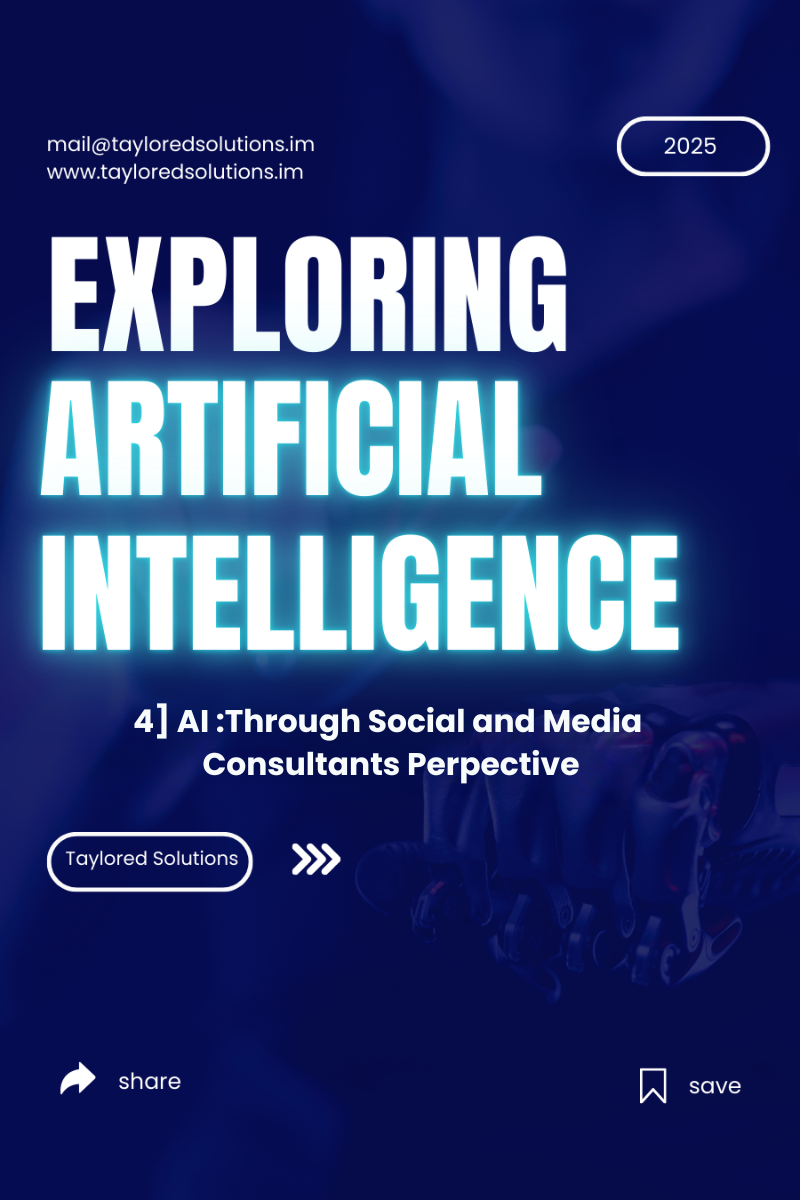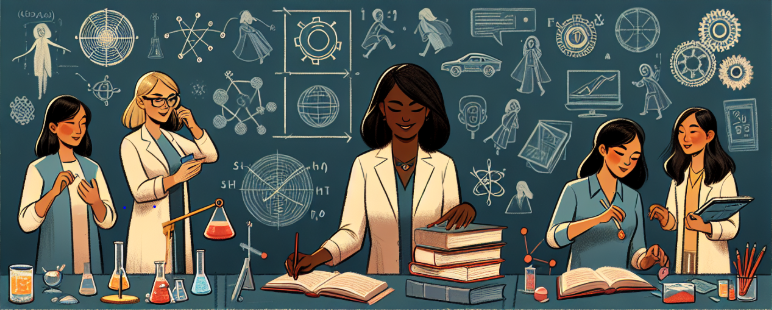Exploring Artificial Intelligence [4]
A Non Tech Perspective

Written by me Sharon, Digital & Social Media Consultant
I'm not a tech expert. I'm Digital & Social media consultant who's figuring things out as I go. AI is definitely one of those things. Unlike Dan, our Director and vCTO who's got all those years of experience and qualifications in this area. I'm learning on the job, and, I am having to learn fast.
This blog is from a different angle than our usual Exploring AI stuff. It's from a personal point of view. It’s not confrontational, it's personal, just my thoughts emptied on to a page. Written partly to help me make sense of it all in my own head, and partly because I figure some of you might be feeling the same way.
While Dan does the tech, I ask questions and try to explain it in a way that makes sense to the majority of us, while keeping it human. Are you like me, interested and amazed yet quite frankly a little terrified by AI?
***
It's Just a Tool?
Here's my take: AI is a tool. Like the machinery that changed farming forever during the farming Industrial revolution. When tractors and harvesters came along, farmers had to make a choice: adapt or get left behind. The ones who embraced these machines could farm more land without breaking their backs. They were still farmers, they just farmed smarter.
It's the same story throughout history. This conversation popped up in the car when we were talking to our daughter about her History homework. Teachers were saying students can’t use AI, we feel why shouldn’t they use AI… I understand what they mean though, it’s not meant to be “don’t use AI for research” (it’s just an advanced version of an internet search). They mean don’t copy and paste without reading it, studying it and owning “your” work “your” perspective, on what AI has found for you. This then started the "you use the tools that make the job easier" discussion. If you think about getting around. When we need to go 20 or more miles, most of us don't walk especially if it's pouring rain. We bus it, drive, ride a bike or grab a train. Using the tools available doesn't make us lazy; it makes us practical. Though images of the humans in WALL-E do pop into my mind.
Animals do it too. Scavengers will happily eat another predator's leftovers rather than hunt themselves. That's not being lazy. That's being smart. AI is the same just newer, it's not about replacing our brains but helping us do more with the time and energy we've got.
***
Losing the Human Touch?
That said, we do need to be cautious. I saw a Social Media post by Steven Bartlett (from Diary of a CEO) that really resonated. He pointed out the shift in tone in emails, and now that it's been mentioned, I’ve noticed it.
What used to be a quick "Hey mate, could you just…?" has turned into a formal "I hope this email finds you well. I would like to discuss…" Now there is a time and a place for those emails, we all have or know that friend (it’s me) that has “their telephone voice” emails are the same. Friendly, personal voices are often being replaced by what sounds like over-polished PR speak, even when it's not needed. Now it's been pointed out, I can't unsee it.
We risk losing the art of conversation (convo). But, to be fair, that train left the station with the invention of texts, accelerated (xlr8’d) with social media, and AI is just speeding it along a little faster. Will we really lose the art of conversation? It’s just adapting, like shorthand which goes all the way back to 1837, so we could write at the speed of the spoken words. I think as long as we recognise the need for the polished email over the friendly chat email, and don’t forget the phone call, we should be ok.
***
AI Makes It Easier, Doesn’t it?
I use AI regularly while drafting posts, editing, and research. But it actually doesn't make my job easier or quicker. If anything, it makes it longer. Why? Because it opens up more rabbit holes than I'd have found on my own. I end up researching more, reading more, and double-checking and fact-checking EVERYTHING. For me, that's a good thing, just not when I need to get a post out but have just found a whole other school of thought on a particular topic I didn’t know. It has kickstarted my curiosity and extended the frequency of the AI topics from 2 weeks to 3 weeks, as I learn things I hadn’t anticipated being in the blog, but absolutely has to feature, can see me drafting and redrafting these things 5/6 times, spending hours reading and researching from reputable sources I can quote.
Recently, when writing one of the Exploring AI series Blogs, as always I keep it neutral. While yes I do have my own opinions, the aim of this series is to help people learn and make their own decisions and opinions. I ran it through an AI tool for feedback and got a telling off, apparently I hadn't kept it neutral at all. Without realising, I'd written it very much from my perspective, and my opinion had steered the entire tone within it.
With AI's help, I started exploring viewpoints I hadn't even considered because I actually didn't know they existed. This led to a yet another complete restructure of the blog and new to me information that I had to research. It was like having my own personal editor or lecturer pointing out my blind spots.
***
From Encyclopedia Battles to Google Classroom
I often think back to school days when we had to do history essays and the library had one copy of the relevant encyclopedia. Queues forming around the table and person who had it. Once we got it, one of us would frantically copy it word for word so we could share it around later at someone’s house. We'd crowd over it, shielding it from other students like it was a top-secret document.
These days, all that information is at your fingertips, which is incredible but it can also be isolating. My kids don't have that same kind of connection. They might chat with friends about homework, but it's generally it’s through smartphones or Google Classroom. It's not quite the same as sitting around the table with snacks and friends, talking it through (and probably ending up with suspiciously similar homework, something our teachers definitely noticed a few times).
I'm not saying one way is better than the other. I just think we need to find a balance.
***
Expanding My World
Anyone who knows me knows I was never into video games. While some of my friends were into their Sega Mega Drives or Super Nintendo consoles, I was out with the horses, down the beach or walking our dogs. I eventually got a Sega, but rarely used it, something my mum predicted accurately. Though I think my dad quite enjoyed it when he could find where I'd left it. Computers were just not my thing.
So to find myself now, actively learning about AI and connecting with people I wouldn't normally meet, it's a bit surreal. These are people whose paths I wouldn't typically cross, but I learn so much from them. I find myself looking forward to the next meeting, to hearing their perspectives, opinion, and sharing discoveries.
***
The Changing of Our Language with AI
There's been a lot of discussion on online about certain words and writing styles becoming more common since AI tools went mainstream, words like "robust" and "leverage," and stylistic choices like the em dash.
Personally, I've never really used "robust" it's just not a word that fits how I write or speak. But "leverage"? That's been in my vocabulary for years. It appeared in my CV and the occasional English essay long before AI came along.
As for the em dash I've seen it in novels pre ChatGPT, Cecelia Ahern has been known to throw a couple in. I've always liked how it adds something extra to a sentence without breaking its flow. I didn't use it at all in my personal social media posts, but my professional social media journey‘s tone is evolving all the time. I definitely reach for it more now, especially when trying to keep sentences fluid yet readable. I'll admit that AI reminded me how useful it is I just didn't realise quite how often I'd start using it!
Interestingly, the em dash is taught in schools part of the curriculum from around Year 6, and sometimes even earlier in Year 5. So while it's having a moment, like any “buzz” it's not new. Like many things AI is "bringing into the spotlight," these elements were already there in data that AI is learning from, so by default we are relearning and so they're appearing more consistently.
So How do we Find the Balance?
I wish I knew. What I do know is AI is here, and like technological advancements that come before it, it's not going away. As with any revolutionary technology, from printing presses to smartphones, it will change how we work and communicate. The question isn't whether to use it, but how to use it wisely and ethically.
For me, AI has become my researcher and editor, rather than a replacement for my own creativity. It challenges my assumptions, broadens my research, and sometimes saves me from oversights. But the final decision of what to include, what tone to use, what message to convey, those, they remain mine.
My AI journey isn't just about the technology itself, but the human connections it's created. The conversations about its potential and downfalls. The often joked “we all remember i-Robot” if you haven’t watched, I recommend it. The community of people I’ve become a small part of figuring it out together.
As I have said, AI is remarkable. Its greatest value might be in enhancing our human capabilities rather than replacing them. If we can find that middle ground, we just might be living in one of the most exciting and maybe slightly scary times in human history.
I’m still learning, still questioning, and still balancing my interest against my fear. If you’ve read this far—well done for making it to the end—it’s probably clear I’ve got a bit of a back-and-forth relationship with AI. And I suppose that’s where most of us are right now: somewhere in the middle, venturing into curiosity and straying into scared.




